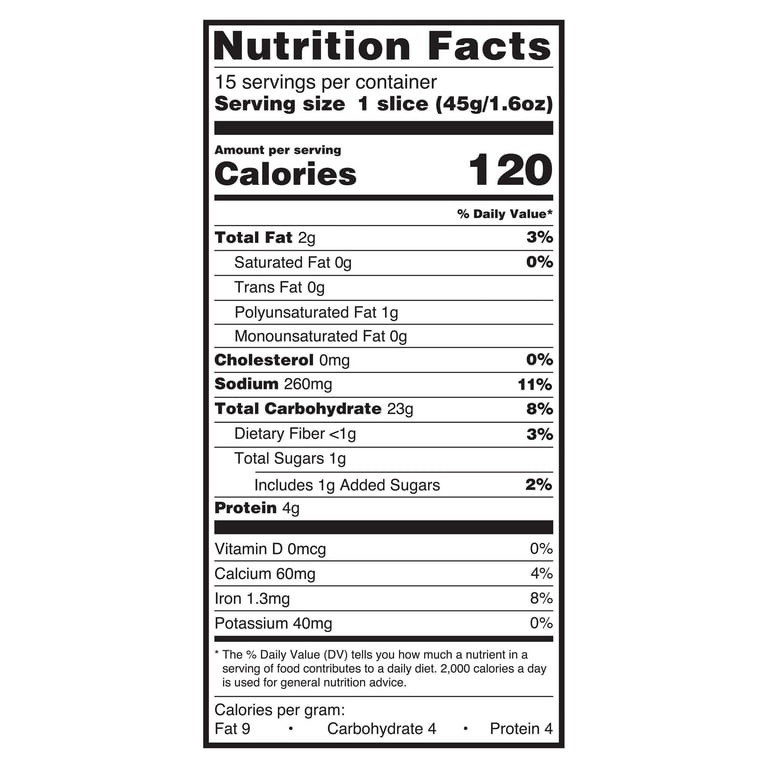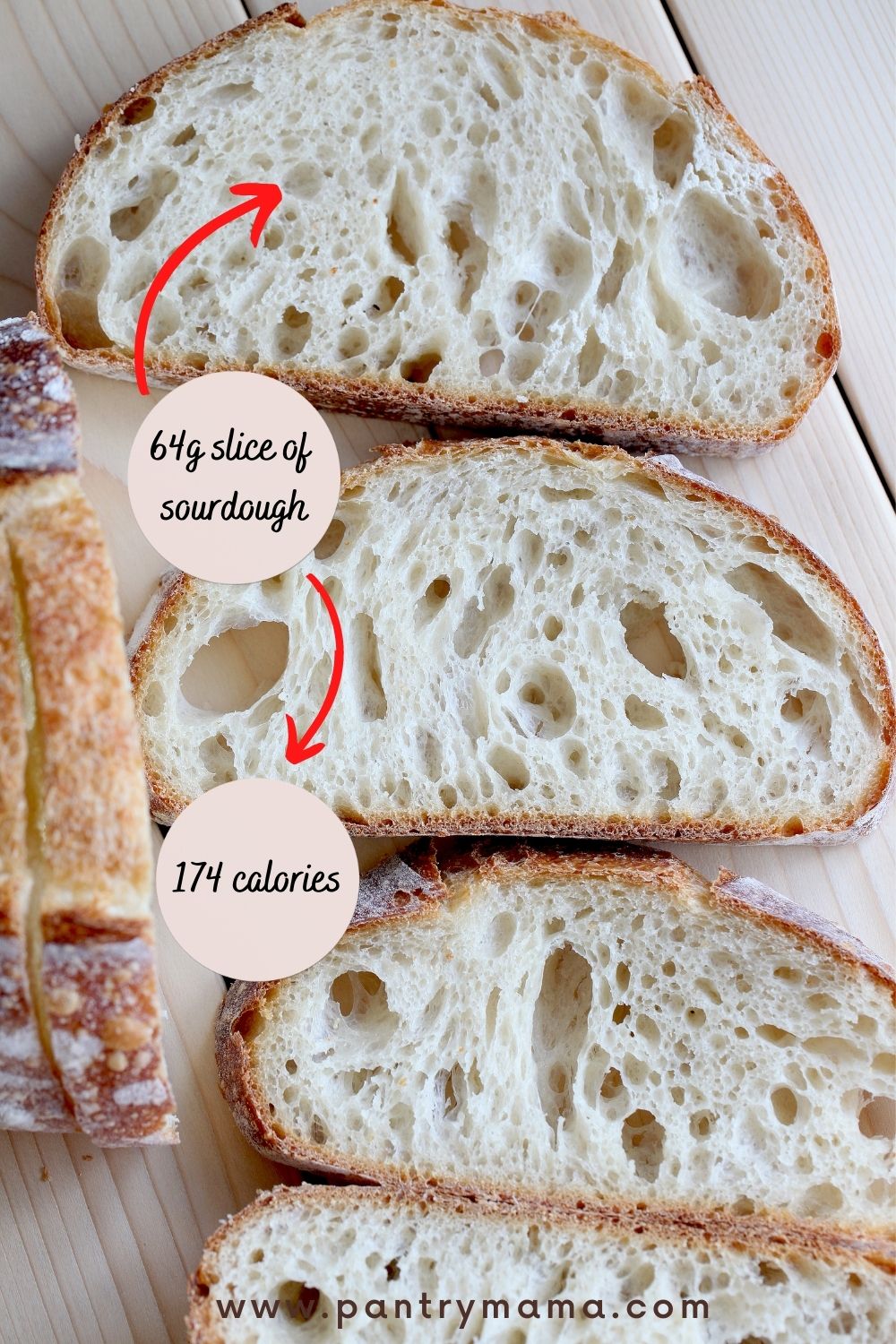Sourdough Nutrition Facts bread has more soluble fiber than regular bread and is good for gut health. It is a healthier alternative with a lower calorie count and potential benefits for blood sugar regulation. Moderation and portion control are key to achieving weight loss goals.

Credit: www.walmart.com
The Basics Of Sourdough
Discover the nutritional benefits of sourdough bread, including its low-calorie count and potential advantages for blood sugar regulation. With its prebiotic qualities and higher soluble fiber content, sourdough bread can be a healthier alternative to regular bread.
What Is Sourdough?
Sourdough is a bread made from natural dough fermentation using wild yeast and lactobacilli bacteria. This fermentation process gives sourdough its characteristic tangy flavor and offers several health benefits.
History Of Sourdough
Sourdough bread has a rich history dating back to ancient civilizations. It was the traditional form of leavened bread for thousands of years before commercial yeast became available. The process of making sourdough bread, with its reliance on natural fermentation, has been passed down through generations, contributing to many regions’ cultural and culinary heritage.
Nutritional Benefits Of Sourdough
Sourdough bread offers a range of nutritional benefits, making it a popular choice for those seeking a healthier alternative to commercially processed bread. It provides a good source of essential nutrients and offers potential advantages for digestion and gut health.
Key Nutrients In Sourdough
Sourdough provides vital nutrients such as zinc, magnesium, and B vitamins. These nutrients aid digestion and support overall health, making sourdough nutritious for those seeking a wholesome and flavorful bread option.
Essential Nutrients in Sourdough Sourdough bread is known for its tangy taste and chewy texture and is rich in crucial nutrients necessary for a healthy diet. This ancient form of bread-making has been shown to contain numerous beneficial nutrients such as fiber and probiotics, making it a popular choice for health-conscious individuals. Let’s take a closer look at the essential nutrients present in sourdough bread. Fiber Content Eating foods high in fiber can improve digestive health. Sourdough bread, being a fermented product, contains a notable amount of fiber, which helps promote regular bowel movements and aids in the prevention of constipation. Probiotics in Sourdough Sourdough bread undergoes a natural fermentation process, allowing beneficial bacteria to thrive. This process produces probiotics in the bread, contributing to good gut health. Probiotics are known for their ability to enhance digestion and strengthen the immune system, making sourdough bread a valuable addition to a balanced diet. In conclusion, sourdough bread offers an array of crucial nutrients that can significantly support overall health and well-being. Its high fiber content and probiotic properties make it a favorable choice for individuals looking to maintain a healthy lifestyle. Calories: Refer to the USDA for specific nutrition details per slice of sourdough bread References: – The Pantry Mama – Great Low Carb Sourdough Bread Great Low Carb Bread Company – La Brea Bakery – Health Benefits of Sourdough Bread, According to a Dietitian – La Brea Bakery – Sourdough bread Nutrition Facts – Eat This Much – Medical Associates of Northwest Arkansas – Is Sourdough Bread Healthy? Dietitians Explain Benefits & Nutrition – EatingWell – Is Sourdough Bread Healthy? – Today.com – Is sourdough bread good for you on a diet? With its lower calorie count and potential benefits for blood sugar regulation… Note: The table is not appropriate for this content.
Comparison With Commercial Bread
Regarding nutrition, sourdough bread stands out from its commercial counterparts. Not only does it have a distinct flavor and texture, but it also offers several health benefits. Let’s explore the nutritional differences between sourdough and commercial bread and how they impact digestion.
Nutritional Differences
Sourdough bread and commercial bread differ significantly in their nutritional composition. Here’s a comparison:
| Nutrient | Sourdough Bread | Commercial Bread |
|---|---|---|
| Calories per slice | 90 | 100 |
| Protein | 3g | 4g |
| Fiber | 2g | 1g |
| Fat | 1g | 1.5g |
| Sodium | 150mg | 200mg |
As you can see, sourdough bread contains fewer calories and less sodium than commercial bread. It also has slightly lower protein and fat but higher fiber content, making it a healthier option overall.
Impact On Digestion
The fermentation process in making sourdough bread contributes to its positive impact on digestion. The lactic acid produced during fermentation enhances the breakdown and absorption of nutrients, making them more readily available to the body. This can lead to improved digestion and nutrient absorption.
Additionally, sourdough bread has a lower glycemic index, which means it causes more minor fluctuations in blood sugar levels compared to commercial bread. This can benefit individuals with diabetes or those looking to regulate their blood sugar levels.
In conclusion, sourdough bread outshines commercial bread when it comes to nutrition and digestion. Its lower calorie content, higher fiber, and improved digestibility make it a healthier option for those looking to make better dietary choices.

Credit: breadsrsly.com
Sourdough And Gluten Sensitivity
Sourdough bread has long been praised for its unique flavor and texture, but it may offer a ray of hope for those with gluten sensitivity. Let’s explore the relationship between sourdough and gluten sensitivity.
Gluten Content In Sourdough
Contrary to popular belief, sourdough bread may be easier to digest for individuals with gluten sensitivity. During the fermentation process, the gluten content in sourdough bread can decrease significantly, making it a potential option for those who struggle with traditional gluten-containing products.
Fermentation And Gluten
The magic of sourdough lies in its fermentation process. This natural process not only enhances the flavor and texture of the bread but also breaks down gluten proteins. As a result, some individuals with gluten sensitivity may find that they can enjoy sourdough without experiencing the usual adverse effects.
Health Benefits Of Sourdough
Sourdough bread is not only delicious but also offers several health benefits. From improved digestibility to potential blood sugar regulation, sourdough bread can be a healthier alternative to regular bread.
Improved Digestibility
Sourdough bread is known for its improved digestibility compared to regular bread. The fermentation process breaks down complex carbohydrates, making them more accessible for the body to digest. This can be especially beneficial for individuals with gluten sensitivity or digestive issues.
Potential Blood Sugar Regulation
Sourdough bread may also have potential benefits for blood sugar regulation. The fermentation process in sourdough bread lowers the bread’s glycemic index, which means it causes a slower and more gradual rise in blood sugar levels compared to regular bread. This can be advantageous for individuals looking to manage their blood sugar levels or those following a low glycemic index diet.
In addition to improved digestibility and potential blood sugar regulation, sourdough bread, due to its higher soluble fiber content, contains prebiotic qualities. This can promote a healthy gut microbiome and overall gut health.
Sourdough bread can be significant if you want to make healthier choices without compromising taste. With its lower calorie count, improved digestibility, and potential benefits for blood sugar regulation, sourdough bread offers a delicious and nutritious alternative to regular bread. Remember, moderation and portion control are vital to achieving your overall health and weight management goals.
References:
- Is sourdough bread good for you on a diet?
- EatingWell – Sourdough Bread: Is It Good for You?
- Healthline – Sourdough Bread: Nutrients, Benefits, and Recipe

Credit: www.pantrymama.com
Incidence Of Sourdough In Different Diets
Sourdough bread has gained popularity for its unique taste and potential health benefits. Let’s explore how sourdough fits into various dietary preferences:
Sourdough In Vegan Diets
In vegan diets, sourdough can be a nutritious choice as it typically doesn’t contain animal products. It provides a source of carbohydrates and can be enriched with seeds and nuts for added nutrients.
Sourdough In Gluten-free Diets
For individuals following gluten-free diets, sourdough made from gluten-free grains like rice or quinoa can be a suitable option. Sourdough fermentation may also help break down gluten proteins, making it easier to digest for some.
Tips For Making Healthy Sourdough Choices
Sourdough bread can be a delicious and nutritious if you make the proper selections. Here are some tips for making healthy sourdough choices.
Choosing Whole Grain Varieties
When selecting sourdough bread, opt for whole-grain varieties for added nutritional benefits. Whole grain sourdough contains the entire grain, providing more fiber, vitamins, and minerals than refined flour. Check the label for “whole grain” or “whole wheat” to ensure you make a healthy choice.
Avoiding Added Sugars
To maintain a healthier option, avoid sourdough bread with added sugars. Some commercial breads may contain added sugars, which can contribute to excess calorie intake and have negative effects on overall health. Check the ingredients list and choose bread with minimal or no added sugars.
Incorporating Sourdough Into A Balanced Diet
Sourdough bread is not only delicious but can also be a healthy addition to your diet. Sourdough can provide essential nutrients and improve overall well-being when incorporated into a balanced diet. This article will explore the benefits of sourdough as a staple in your diet and how to pair it with nutrient-rich foods. Let’s delve into sourdough’s nutritional value and role in promoting a balanced diet.
Sourdough As A Staple
Sourdough bread, traditionally made with a natural fermentation process, offers a unique nutritional profile compared to conventional bread. It contains beneficial bacteria and yeast, which contribute to its prebiotic qualities. This fermentation process may increase nutrient absorption, making the nutrients in sourdough more accessible to the body. Additionally, sourdough bread is lower in sugar. It has a lower glycemic index than many commercial bread varieties, making it a favorable choice for those seeking to manage their blood sugar levels.
Pairing Sourdough Nutrition Facts With Nutrient-rich Foods
Pairing sourdough with various nutrient-rich foods can enhance its role in a balanced diet. Combine sourdough with protein sources like lean meats, tofu, or eggs to create a satisfying and nutrient-dense meal. Top a slice of sourdough with avocado, spinach, and tomatoes for healthy fats, vitamins, and minerals. Incorporating sourdough alongside fiber-rich vegetables and fruits into your diet can further bolster its nutritional impact. This diverse pairing can contribute to a well-rounded and nourishing eating plan.
Frequently Asked Questions
Is Sourdough The Healthiest Bread?
Sourdough bread has more soluble fiber, making it healthier for gut health. With a lower calorie count and potential blood sugar benefits, it’s an excellent alternative to regular bread for weight control.
Is Sourdough Bread Good For You On A Diet?
Yes, sourdough bread is good for you on a diet. It has a lower calorie count and potential benefits for blood sugar regulation. It also has more soluble fiber than regular bread, which can benefit gut health. Remember to practice moderation and portion control.
What Is The Nutritional Value Of Sourdough Bread?
Sourdough bread is rich in fiber, vitamins, and minerals. It’s lower in sugar and has a prebiotic effect, supporting gut health. One slice contains approximately 80 calories and varies by brand.
Which Bread Is The Healthiest?
The healthiest bread is sprouted whole grain, sourdough, oat, flax, and healthy gluten-free bread.
Conclusion
With its prebiotic qualities and higher soluble fiber content, Sourdough bread is a healthier alternative to regular bread. It can promote gut health and aid in blood sugar regulation. With its lower calorie count, sourdough bread can be a great addition to a weight-loss diet.
Remember, moderation and portion control are vital to achieving your goals. Enjoy the delicious and nutritious benefits of sourdough bread!



